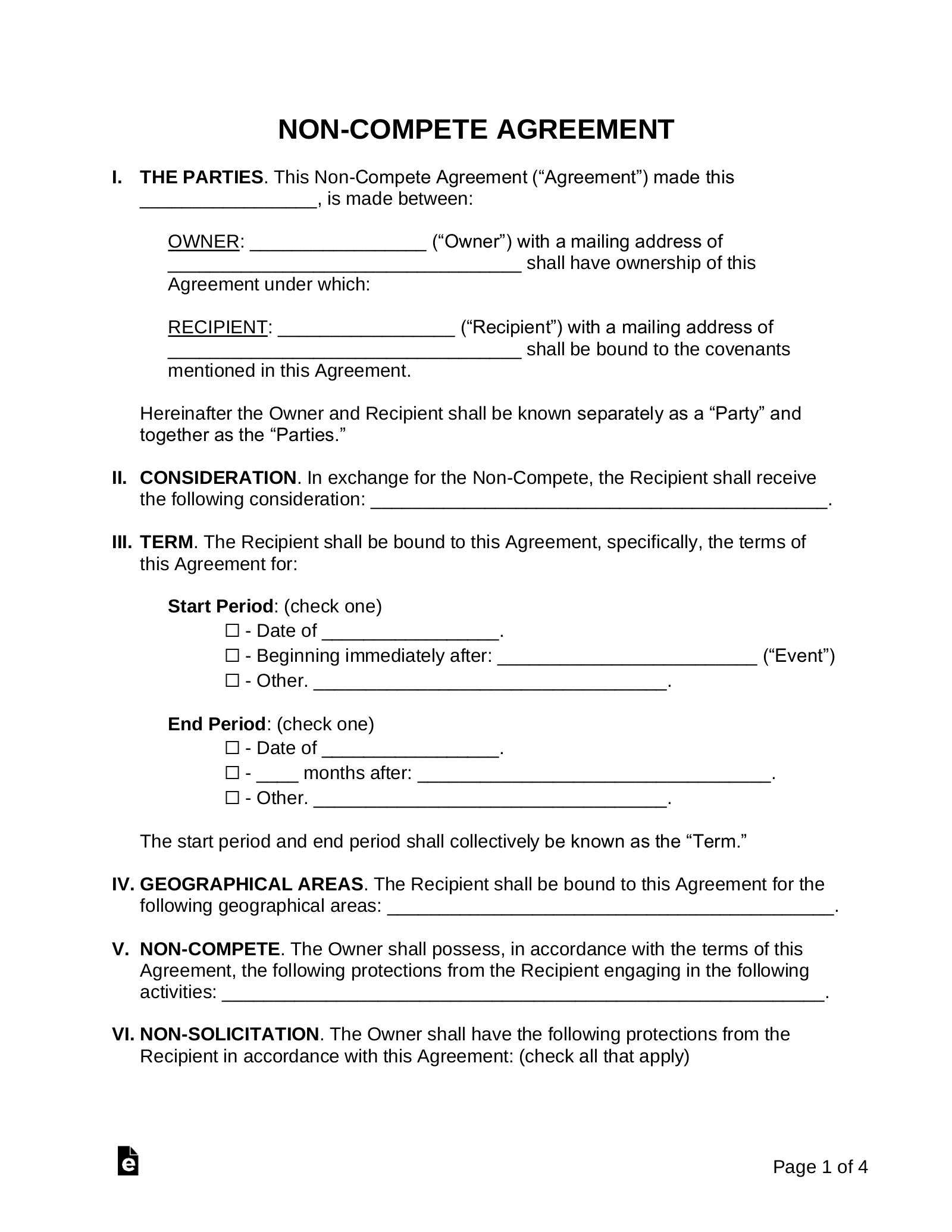Noncompete Contract Limitations in Arizona
Noncompete contracts are legal agreements that prevent employees from working with competitors after leaving a job. In Arizona, these contracts have specific limitations and requirements to ensure they are fair to both parties. It’s important to understand what makes a noncompete enforceable and how long it can last. This post will cover the key aspects of noncompete agreements in Arizona, focusing on legality, duration, and more.
What Makes a Noncompete Contract Legal in Arizona?

In Arizona, noncompete contracts must meet certain legal standards to be enforceable. They must protect a legitimate business interest, such as trade secrets or client relationships. Here are the key elements that make a noncompete agreement legal in the state:
- Reasonable Scope: The contract must not be overly broad in terms of geography or job function.
- Legitimate Purpose: The employer must show that the agreement is necessary to protect important business interests.
- Fair Duration: The length of time the employee is restricted must be reasonable, usually limited to a few years.
- Consideration: Employees must receive something in return, such as a job offer or promotion, for agreeing to the noncompete.
Arizona courts often scrutinize these agreements to ensure they are not restricting employees more than necessary. If a contract is too restrictive, it may be invalidated or modified by the court.
How Long Can a Noncompete Contract Last?
The duration of a noncompete contract in Arizona must be reasonable to be enforceable. Generally, courts in Arizona consider a noncompete period of six months to two years as acceptable, though this can vary depending on the industry or position. Here’s what you need to know about how long a noncompete can last:
- Standard Duration: Most noncompete agreements last between six months and two years.
- Industry-Specific Rules: Certain industries, like tech or healthcare, might allow slightly longer periods due to the sensitive nature of their work.
- Negotiated Terms: Employers and employees can sometimes negotiate shorter or longer terms based on specific roles and responsibilities.
If a court finds the time restriction to be unreasonable, it can shorten the duration or strike down the contract entirely. It’s essential to ensure the length of time aligns with Arizona’s standards to avoid legal issues.
Industries Affected by Noncompete Agreements
Noncompete agreements are used across many industries in Arizona, though some sectors rely on them more heavily than others. These contracts are designed to protect a company’s interests, particularly in industries where sensitive information or trade secrets are at stake. Below are some of the industries where noncompete agreements are most common:
- Technology: Companies in tech often require noncompete agreements to protect proprietary software, algorithms, and confidential product information.
- Healthcare: Doctors, nurses, and healthcare professionals may be bound by noncompete clauses to prevent them from joining competing practices or hospitals nearby.
- Sales and Marketing: Employees with access to client lists and sensitive sales strategies are often subject to noncompete restrictions to prevent sharing of valuable business contacts.
- Finance: In the financial services industry, noncompete clauses help safeguard client relationships and confidential investment strategies.
- Manufacturing: Companies in this sector use noncompete agreements to protect trade secrets, especially in specialized production methods or proprietary designs.
While these industries frequently use noncompete agreements, it’s important to note that the enforceability of these contracts can vary depending on the position and the specific terms of the agreement.
Employee Rights Under Noncompete Agreements
Employees in Arizona have rights when it comes to noncompete agreements. These contracts cannot be overly restrictive or prevent an employee from making a living in their chosen field. Here are some key rights employees have under Arizona law:
- Right to Fair Terms: The noncompete agreement must be reasonable in scope, duration, and geography.
- Right to Challenge: If an employee believes a noncompete agreement is unfair or overly restrictive, they can challenge it in court.
- Right to Legal Representation: Employees are entitled to seek legal advice before signing a noncompete agreement to understand their rights fully.
- Right to Work: Even with a noncompete agreement in place, employees have the right to pursue employment opportunities that do not violate the terms of the agreement.
In Arizona, courts tend to favor employees if a noncompete is found to be too restrictive. If the contract significantly limits an employee’s ability to find new work, a judge may modify or void the agreement.
Exceptions to Noncompete Contract Enforceability
While noncompete agreements are generally enforceable in Arizona, there are several exceptions where a court may decide not to uphold the terms of the contract. These exceptions are designed to ensure that the contract is not overly burdensome to the employee. Some of the main exceptions include:
- Unreasonable Restrictions: If the contract is too broad in terms of time, geography, or scope of work, it may be deemed unenforceable.
- Lack of Consideration: If an employee did not receive any benefit (like a job offer or promotion) in exchange for signing the noncompete, the contract may be invalid.
- Public Interest: In some industries, such as healthcare, courts may rule that enforcing a noncompete agreement is against the public interest, particularly if it would limit access to essential services.
- Wrongful Termination: If an employee was wrongfully terminated, the noncompete agreement may be voided by the court.
It’s important for both employers and employees to understand these exceptions, as they can play a significant role in whether or not a noncompete agreement is enforceable in Arizona.
Penalties for Violating Noncompete Contracts
Violating a noncompete contract in Arizona can lead to serious consequences for employees. While the penalties vary depending on the terms of the agreement, employers often pursue legal action to enforce the contract. Here’s a breakdown of the common penalties employees may face:
- Injunctions: The most common penalty is a court order, or injunction, that forces the employee to stop working for the competitor.
- Financial Damages: Employers may seek financial compensation if they can prove that the employee’s violation caused a financial loss to the company.
- Attorney’s Fees: In some cases, the violating party may be required to pay the employer’s legal fees if the court rules in favor of the employer.
- Loss of Employment: Employees may lose their job with the new employer if the noncompete contract is enforced, as companies may be hesitant to retain workers involved in legal disputes.
It’s important to note that penalties can be avoided if the employee negotiates a resolution with their former employer or if the court determines that the noncompete agreement is unenforceable.
How Courts in Arizona Handle Noncompete Disputes
When a noncompete agreement is challenged in Arizona courts, the judge will carefully review the contract to determine its fairness and enforceability. Courts in Arizona generally balance the employer’s need to protect their business with the employee’s right to earn a living. Here’s what courts typically consider in noncompete disputes:
- Reasonableness: The court will examine whether the terms of the contract are reasonable in terms of time, geography, and scope of restrictions.
- Business Interest: Judges look to see if the employer is protecting a legitimate business interest, such as trade secrets or client relationships.
- Employee Impact: Courts will assess how the noncompete agreement affects the employee’s ability to find work in their field.
- Contract Modifications: If a noncompete agreement is found to be overly restrictive, courts may modify it to make the terms more reasonable, rather than voiding the contract entirely.
Arizona courts are known for their careful analysis of noncompete agreements and generally try to strike a fair balance between both parties.
FAQ: Common Questions About Noncompete Agreements in Arizona
Noncompete agreements can be confusing, especially when it comes to their legality and enforceability. Below are answers to some of the most frequently asked questions about noncompete contracts in Arizona:
- Are noncompete agreements legal in Arizona? Yes, noncompete agreements are legal, but they must meet specific requirements to be enforceable.
- How long can a noncompete agreement last in Arizona? Typically, noncompete contracts last between six months to two years, but the duration must be reasonable based on the industry and position.
- Can a noncompete agreement prevent me from working in my field? A noncompete should not prevent you from earning a living. If it’s too restrictive, you may be able to challenge it in court.
- What happens if I violate a noncompete contract? You may face legal action, including injunctions, financial damages, and possible loss of employment.
- Can I negotiate the terms of a noncompete agreement? Yes, it’s always a good idea to negotiate the terms of a noncompete before signing to ensure they are fair and reasonable.
If you have more questions about noncompete agreements in Arizona, it’s always a good idea to consult a legal professional.
Conclusion: Protecting Your Rights in Arizona Noncompete Contracts
Noncompete contracts can significantly impact your career and future employment opportunities. It’s essential to understand the limitations and enforceability of these agreements in Arizona. Whether you’re an employer seeking to protect your business or an employee navigating the terms of a noncompete, knowing your rights is crucial. Ensure that the agreement is reasonable, protects legitimate interests, and doesn’t unfairly restrict your ability to work. If in doubt, consult with legal counsel to review your contract and help you protect your rights effectively under Arizona law.


